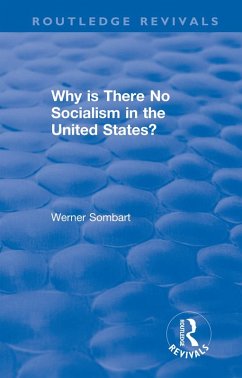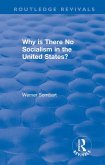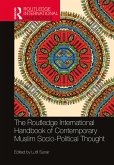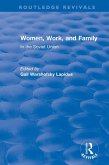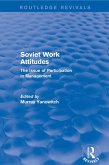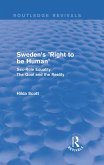W. Sombart
Revival: Why is there no Socialism in the United States? (1976) (eBook, PDF)
44,95 €
44,95 €
inkl. MwSt.
Sofort per Download lieferbar

22 °P sammeln
44,95 €
Als Download kaufen

44,95 €
inkl. MwSt.
Sofort per Download lieferbar

22 °P sammeln
Jetzt verschenken
Alle Infos zum eBook verschenken
44,95 €
inkl. MwSt.
Sofort per Download lieferbar
Alle Infos zum eBook verschenken

22 °P sammeln
W. Sombart
Revival: Why is there no Socialism in the United States? (1976) (eBook, PDF)
- Format: PDF
- Merkliste
- Auf die Merkliste
- Bewerten Bewerten
- Teilen
- Produkt teilen
- Produkterinnerung
- Produkterinnerung

Bitte loggen Sie sich zunächst in Ihr Kundenkonto ein oder registrieren Sie sich bei
bücher.de, um das eBook-Abo tolino select nutzen zu können.
Hier können Sie sich einloggen
Hier können Sie sich einloggen
Sie sind bereits eingeloggt. Klicken Sie auf 2. tolino select Abo, um fortzufahren.

Bitte loggen Sie sich zunächst in Ihr Kundenkonto ein oder registrieren Sie sich bei bücher.de, um das eBook-Abo tolino select nutzen zu können.
Why is the United States the only advanced capitalist country with no labor party? This question is one of the great enduring puzzles of American political development, and it lies at the heart of a fundamental debate about the nature of American society.
- Geräte: PC
- mit Kopierschutz
- eBook Hilfe
- Größe: 38.81MB
Andere Kunden interessierten sich auch für
![Revival: Why is there no Socialism in the United States? (1976) (eBook, ePUB) Revival: Why is there no Socialism in the United States? (1976) (eBook, ePUB)]() W. SombartRevival: Why is there no Socialism in the United States? (1976) (eBook, ePUB)44,95 €
W. SombartRevival: Why is there no Socialism in the United States? (1976) (eBook, ePUB)44,95 €![The Routledge International Handbook of Contemporary Muslim Socio-Political Thought (eBook, PDF) The Routledge International Handbook of Contemporary Muslim Socio-Political Thought (eBook, PDF)]() The Routledge International Handbook of Contemporary Muslim Socio-Political Thought (eBook, PDF)46,95 €
The Routledge International Handbook of Contemporary Muslim Socio-Political Thought (eBook, PDF)46,95 €![Revival: Women, Work and Family in the Soviet Union (1982) (eBook, PDF) Revival: Women, Work and Family in the Soviet Union (1982) (eBook, PDF)]() Gail LapidusRevival: Women, Work and Family in the Soviet Union (1982) (eBook, PDF)44,95 €
Gail LapidusRevival: Women, Work and Family in the Soviet Union (1982) (eBook, PDF)44,95 €![Revival: Soviet Work Attitudes (1979) (eBook, PDF) Revival: Soviet Work Attitudes (1979) (eBook, PDF)]() Murray YanowitchRevival: Soviet Work Attitudes (1979) (eBook, PDF)46,95 €
Murray YanowitchRevival: Soviet Work Attitudes (1979) (eBook, PDF)46,95 €![There Ain't No Black in the Union Jack (eBook, PDF) There Ain't No Black in the Union Jack (eBook, PDF)]() Paul GilroyThere Ain't No Black in the Union Jack (eBook, PDF)15,95 €
Paul GilroyThere Ain't No Black in the Union Jack (eBook, PDF)15,95 €![Why Are There Still Creationists? (eBook, PDF) Why Are There Still Creationists? (eBook, PDF)]() Jonathan MarksWhy Are There Still Creationists? (eBook, PDF)16,99 €
Jonathan MarksWhy Are There Still Creationists? (eBook, PDF)16,99 €![Revival: Sweden's Right to be Human (1982) (eBook, PDF) Revival: Sweden's Right to be Human (1982) (eBook, PDF)]() Hilda ScottRevival: Sweden's Right to be Human (1982) (eBook, PDF)30,95 €
Hilda ScottRevival: Sweden's Right to be Human (1982) (eBook, PDF)30,95 €-
-
-
Why is the United States the only advanced capitalist country with no labor party? This question is one of the great enduring puzzles of American political development, and it lies at the heart of a fundamental debate about the nature of American society.
Dieser Download kann aus rechtlichen Gründen nur mit Rechnungsadresse in A, B, BG, CY, CZ, D, DK, EW, E, FIN, F, GR, HR, H, IRL, I, LT, L, LR, M, NL, PL, P, R, S, SLO, SK ausgeliefert werden.
Produktdetails
- Produktdetails
- Verlag: Taylor & Francis
- Seitenzahl: 231
- Erscheinungstermin: 28. Juli 2017
- Englisch
- ISBN-13: 9781351696593
- Artikelnr.: 48960425
- Verlag: Taylor & Francis
- Seitenzahl: 231
- Erscheinungstermin: 28. Juli 2017
- Englisch
- ISBN-13: 9781351696593
- Artikelnr.: 48960425
- Herstellerkennzeichnung Die Herstellerinformationen sind derzeit nicht verfügbar.
W Sombart
Why is the United States the only advanced capitalist country with no labor
party? This question is one of the great enduring puzzles of American
political development, and it lies at the heart of a fundamental debate
about the nature of American society. Tackling this debate head-on, Robin
Archer puts forward a new explanation for why there is no American labor
party-an explanation that suggests that much of the conventional wisdom
about American exceptionalism is untenable. Conventional explanations rely
on comparison with Europe. Archer challenges these explanations by
comparing the United States with its most similar New World
counterpart-Australia. This comparison is particularly revealing, not only
because the United States and Australia share many fundamental historical,
political, and social characteristics, but also because Australian unions
established a labor party in the late nineteenth century, just when
American unions, against a common backdrop of industrial defeat and
depression, came closest to doing something similar. Archer examines each
of the factors that could help explain the American outcome, and his
systematic comparison yields unexpected conclusions. He argues that
prosperity, democracy, liberalism, and racial hostility often promoted the
very changes they are said to have obstructed. And he shows that it was not
these characteristics that left the United States without a labor party,
but, rather, the powerful impact of repression, religion, and political
sectarianism.
party? This question is one of the great enduring puzzles of American
political development, and it lies at the heart of a fundamental debate
about the nature of American society. Tackling this debate head-on, Robin
Archer puts forward a new explanation for why there is no American labor
party-an explanation that suggests that much of the conventional wisdom
about American exceptionalism is untenable. Conventional explanations rely
on comparison with Europe. Archer challenges these explanations by
comparing the United States with its most similar New World
counterpart-Australia. This comparison is particularly revealing, not only
because the United States and Australia share many fundamental historical,
political, and social characteristics, but also because Australian unions
established a labor party in the late nineteenth century, just when
American unions, against a common backdrop of industrial defeat and
depression, came closest to doing something similar. Archer examines each
of the factors that could help explain the American outcome, and his
systematic comparison yields unexpected conclusions. He argues that
prosperity, democracy, liberalism, and racial hostility often promoted the
very changes they are said to have obstructed. And he shows that it was not
these characteristics that left the United States without a labor party,
but, rather, the powerful impact of repression, religion, and political
sectarianism.
Why is the United States the only advanced capitalist country with no labor
party? This question is one of the great enduring puzzles of American
political development, and it lies at the heart of a fundamental debate
about the nature of American society. Tackling this debate head-on, Robin
Archer puts forward a new explanation for why there is no American labor
party-an explanation that suggests that much of the conventional wisdom
about American exceptionalism is untenable. Conventional explanations rely
on comparison with Europe. Archer challenges these explanations by
comparing the United States with its most similar New World
counterpart-Australia. This comparison is particularly revealing, not only
because the United States and Australia share many fundamental historical,
political, and social characteristics, but also because Australian unions
established a labor party in the late nineteenth century, just when
American unions, against a common backdrop of industrial defeat and
depression, came closest to doing something similar. Archer examines each
of the factors that could help explain the American outcome, and his
systematic comparison yields unexpected conclusions. He argues that
prosperity, democracy, liberalism, and racial hostility often promoted the
very changes they are said to have obstructed. And he shows that it was not
these characteristics that left the United States without a labor party,
but, rather, the powerful impact of repression, religion, and political
sectarianism.
party? This question is one of the great enduring puzzles of American
political development, and it lies at the heart of a fundamental debate
about the nature of American society. Tackling this debate head-on, Robin
Archer puts forward a new explanation for why there is no American labor
party-an explanation that suggests that much of the conventional wisdom
about American exceptionalism is untenable. Conventional explanations rely
on comparison with Europe. Archer challenges these explanations by
comparing the United States with its most similar New World
counterpart-Australia. This comparison is particularly revealing, not only
because the United States and Australia share many fundamental historical,
political, and social characteristics, but also because Australian unions
established a labor party in the late nineteenth century, just when
American unions, against a common backdrop of industrial defeat and
depression, came closest to doing something similar. Archer examines each
of the factors that could help explain the American outcome, and his
systematic comparison yields unexpected conclusions. He argues that
prosperity, democracy, liberalism, and racial hostility often promoted the
very changes they are said to have obstructed. And he shows that it was not
these characteristics that left the United States without a labor party,
but, rather, the powerful impact of repression, religion, and political
sectarianism.
